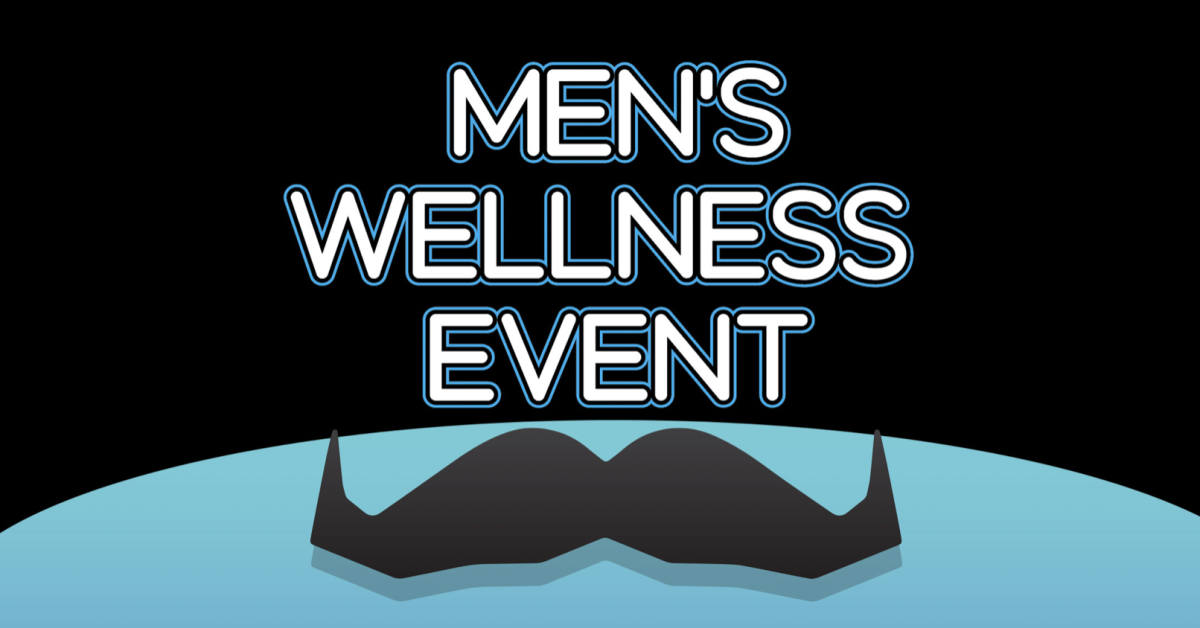The evening highlighted missing resources and a need for connection

Promotional image via the Anti-Violence Project.
The Anti-Violence Project (AVP), UVic’s sexual assault support centre, facilitated a Men’s Wellness panel on Nov. 23.
The two-hour-long discussion featured five speakers in the David Strong Lecture Hall. Each desk was equipped with complimentary notepads and pens, and outside sat an abundant table of snacks and refreshments.
The event, which was carefully constructed but sparsely attended, was a perfect example of the catch-22 situation that keeps men emotionally unsupported by one another and themselves.
There is a stigma about the kind of emotional vulnerability it would take to attend an event like this one. The prospect of attending this event, which bolsters the importance of male community, could be easily shrugged off in a hypermasculine display of strength in self-containment. This means that the men who might benefit most from an open dialogue about mens’ mental health and relational wellness are the very people who would be least likely to attend something like the Men’s Wellness panel.
And what a shame because the space that the evening’s five panelists created at this event was safe, constructive, authentic, and evidently necessary.
A majority of attendees stayed for the two-hour duration of the event, took notes, and when the question period came, submitted questions for mental health or relationship advice from the panelists.
The five panelists, including but not limited to a mental health outreach worker, a men’s therapist, a sex educator, and a coordinator for the AVP’s Men’s Circle discussion group were each allotted 10 minutes to discuss their opinions on a different pre-assigned topic, such as accountability, asking for help, or belonging.
One panelist called on men to challenge the distinctly male mental framework which suggests that men are inherently undeserving of care and nurture. Another emphasized that men’s mental health struggles are downstream of root struggles which stem from patriarchal values, not individual failures. Resisting connotations around manhood that liken it to a kind of monstrous identity was a recurring theme for the third panelist, and another posed the importance of men creating space for each other that promises rehabilitation after mistakes made, not ostracization.
At times, the panelists’ passion about their respective subjects implored the audience to find a path that the speakers themselves hadn’t. At others, their discussions erred toward a candid, lighthearted man-to-man conversation.
Events like these, for mens’ wellness or any other social issue, are important demonstrations of support for folks who might be looking for resources or community.
One way to access support that lasts beyond a single evening is to visit the Men’s Circle, shared a panelist. Facilitated by the Anti-Violence Project, the Men’s Circle is an initiative for men to meet weekly via Zoom, gather (though not physically, for the sake of everyone’s health and safety at this time), and connect in a safe space.
Male solidarity was palpable in the room, and the Men’s Circle promises to fulfill a need for community beyond the scope of the evening. However, two male friends who attended the event with me said that practical, actionable advice for men seeking to improve their mental and emotional wellness was missing. They explained that they appreciated the panelists’ candor, but couldn’t help but feel somewhat lost in vague ideology and general discussion.
After the event, one of my friends raised the point that the accountability panelist spoke more generally about the importance of accountability culture than what accountability looks like in practice.
“Sure, but if your friend [assaults] someone, what should you do?” he asked.
I couldn’t help but wonder where that left the other men who attended the event that night hoping for actionable advice on specific or complex issues that they struggled to find answers for elsewhere.
It is important to note that the event didn’t market itself to be a place for actionable steps toward better mental health, wellbeing, or building community — it was clear that the panel intended to simply open a discussion around men’s wellness. On AVP’s website, the event page reads: “Let’s talk about our relationships and mental health!”
One of the panelists even addressed this in his testimony. He urged the attendees early on in the evening not to consider the panel as five experts who have it all figured out, but to consider them instead a group of people inviting other men to join them as they work toward progress.
As this was the promise of the event, it is safe to say that it more than delivered. All in all, the event was evidence that community care through solidarity is a surefire way to make connections, and thus, meaningful progress toward destigmatizing men’s mental health care — that is, if people are willing to partake.
If you or somebody you know are looking for support, these local resources (as provided by the Anti-Violence Project’s event) are here to help:
- The Men’s Therapy Centre
- Victoria Sexual Assault Centre
- Heads Up Guys
- Health Initiative for Men







